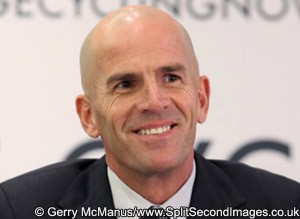Ashenden: ‘I would find any explanation the UCI gives now about test statistics very difficult to believe’
 A year and a half after the UCI strongly rejected suggestions that it had cut back on its biological passport testing, criticising Cervélo co-founder Gerard Vroomen for his suggestion that less tests were being carried out, evidence has emerged which appears to show that this was indeed the case.
A year and a half after the UCI strongly rejected suggestions that it had cut back on its biological passport testing, criticising Cervélo co-founder Gerard Vroomen for his suggestion that less tests were being carried out, evidence has emerged which appears to show that this was indeed the case.
Michael Ashenden (pictured), who for years was part of the panel of experts which assessed biological passport cases, has obtained a copy of UCI documents which show that testing was reduced in 2010, despite the UCI’s insistence to the contrary.
The document in question was the minutes from the UCI’s Cycling Anti-Doping Foundation (‘CADF’) meeting in June 2010. These were discovered by Swiss magazine Beobachter and then passed on to Dr. Ashenden.
In those minutes, a loss of over half a million Swiss francs was noted. Translated from French, the document states that “the CADF registered a loss of CHF 640,000 for the year 2009, while stressing that the difference would be with the 2010 income”.
It notes that the CADF director Dr Francesca Rossi said that cutbacks would be implemented as a result. “Following the budget cuts, the testing program for 2010 has been reduced especially for the ‘older’ riders with also a reduction in the number of tests until later this year.”
This corresponds with the suggestion made by Vroomen at the time in his online blog, when he said that he had not heard of any biological passport samples being collected from riders between July 2010 and April 2011.
However, despite the fact that the CADF document now seems to back up his reporting that cuts had been made, the UCI attacked him in a press release one day after his blog entry was posted. It said that his ‘allegations’ were ‘misleading, irresponsible, mischievous and clearly show a very weak understanding of this complex subject.’
Speaking to VeloNation today, Ashenden said that when he was serving on the biological passport board, that it became increasingly obviously that the testing programme had been slashed.
“The gap in passports was a sense that grew over time. One or two instances might have been pure chance, but eventually it became so prevalent that it left a clear impression on me,” the Australian said.
Asked if he could approximate what reductions were made, he said it was a very difficult task. “I’m not sure how to estimate how many tests were cut – and the problem is we cannot rely on what the UCI tells us so we may never know,” he stated. “They colluded with Armstrong when he lied about being tested more than 500 times, so I would find any explanation the UCI gives now about test statistics very difficult to believe.”
UCI President Pat McQuaid attended the meeting in question, and was therefore aware of the cuts. Ashenden has said that this latest development raises further questions about McQuaid’s ability to lead the governing body.
“What is most disturbing about this issue is the UCI’s apparent willingness to publicly denigrate Gerard Vroomen when he voiced concerns about the frequency of testing and in particular, its disingenuous utilisation of statistics when doing so,” he stated today. “The minutes from the meeting inevitably casts further doubt on the credibility and transparency of its current President Pat McQuaid.”
The UCI receives large sums of money from professional teams in order to fund the biological passport programme, and regularly refers to this programme as proof that the governing body is doing more to fight doping that other sporting federations. However there is little public transparency about the precise amount and nature of testing that is being done.
The Change Cycling Now pressure group, of which Ashenden is a member, has called again for McQuaid to stand down as president.
Also see: Varying responses to questions raised about biological passport by Gerard Vroomen